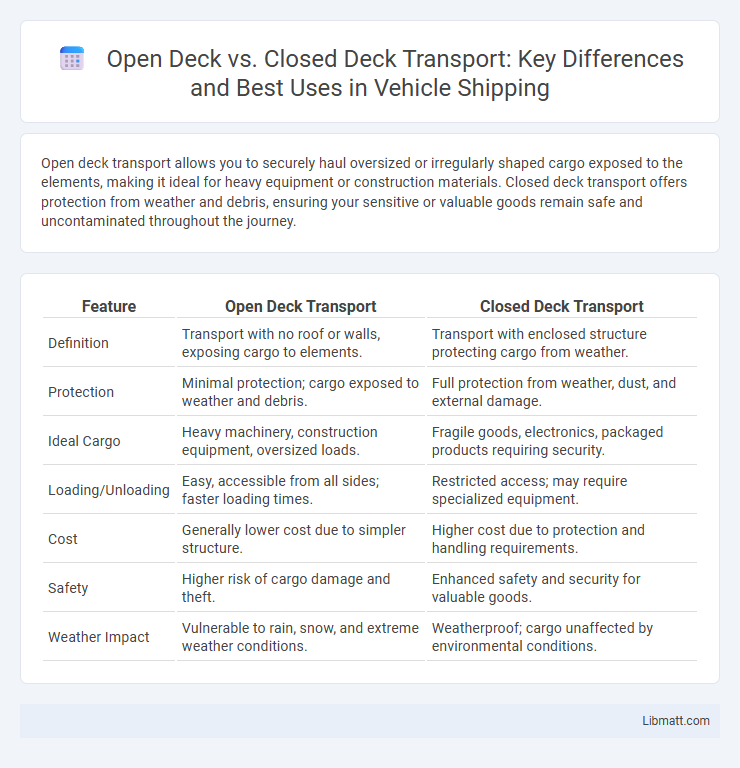Open deck transport allows you to securely haul oversized or irregularly shaped cargo exposed to the elements, making it ideal for heavy equipment or construction materials. Closed deck transport offers protection from weather and debris, ensuring your sensitive or valuable goods remain safe and uncontaminated throughout the journey.
Table of Comparison
| Feature | Open Deck Transport | Closed Deck Transport |
|---|---|---|
| Definition | Transport with no roof or walls, exposing cargo to elements. | Transport with enclosed structure protecting cargo from weather. |
| Protection | Minimal protection; cargo exposed to weather and debris. | Full protection from weather, dust, and external damage. |
| Ideal Cargo | Heavy machinery, construction equipment, oversized loads. | Fragile goods, electronics, packaged products requiring security. |
| Loading/Unloading | Easy, accessible from all sides; faster loading times. | Restricted access; may require specialized equipment. |
| Cost | Generally lower cost due to simpler structure. | Higher cost due to protection and handling requirements. |
| Safety | Higher risk of cargo damage and theft. | Enhanced safety and security for valuable goods. |
| Weather Impact | Vulnerable to rain, snow, and extreme weather conditions. | Weatherproof; cargo unaffected by environmental conditions. |
Introduction to Vehicle Transport Methods
Open deck transport involves vehicles being loaded onto flatbeds exposed to external elements, offering cost-effective shipping with easier loading and unloading. Closed deck transport uses enclosed carriers that protect vehicles from weather and debris, providing enhanced security and damage prevention during transit. Selecting between open and closed deck transport depends on factors like vehicle value, distance, and budget constraints.
What is Open Deck Transport?
Open deck transport refers to a type of vehicle shipping method where cargo is loaded on a flatbed trailer without sidewalls or a roof, allowing for easy loading and unloading of oversized or irregularly shaped items. This transport option is ideal for machinery, construction equipment, and large vehicles that exceed the dimensions of enclosed trailers. You benefit from increased flexibility and quicker access when choosing open deck transport for your heavy or bulky shipments.
What is Closed Deck Transport?
Closed deck transport involves moving goods in fully enclosed trailers or containers, protecting cargo from weather, theft, and damage during transit. This method ensures increased security and is ideal for sensitive, valuable, or fragile items requiring controlled environments. Choosing closed deck transport helps you maintain the integrity and safety of your shipment from origin to destination.
Key Differences Between Open Deck and Closed Deck Transport
Open deck transport features a trailer with an exposed flatbed, ideal for oversized or irregularly shaped cargo, allowing easy loading and unloading from multiple angles. Closed deck transport, often referred to as enclosed trailers, provides full protection from weather and road debris, making it suitable for high-value or sensitive goods. Understanding these key differences helps you choose the right method based on your cargo's security and exposure requirements.
Cost Comparison: Open vs Closed Deck
Open deck transport typically offers lower costs due to its simpler design and easier loading processes, making it a budget-friendly option for hauling oversized or irregularly shaped cargo. Closed deck transport provides enhanced protection against weather and road debris, which can justify higher pricing due to increased materials and maintenance requirements. Your choice should balance the cost savings of open decks with the added security and preservation benefits of closed deck transport based on cargo sensitivity.
Safety and Security Considerations
Open deck transport exposes cargo to external elements, increasing risks of weather damage, theft, and debris impact, making it less secure for sensitive or high-value goods. Closed deck transport offers enhanced protection through enclosed structures, reducing exposure to environmental hazards and unauthorized access, thereby improving overall cargo safety and security. Selecting closed deck options is preferable for transporting fragile, valuable, or hazardous materials that require controlled conditions throughout transit.
Vehicle Types Best Suited for Each Method
Open deck transport is best suited for large, oversized vehicles such as construction equipment, agricultural machinery, and oversized trucks that require easy loading and unloading without height restrictions. Closed deck transport is ideal for high-value, luxury, or vintage vehicles including sports cars, classic cars, and motorcycles, providing enhanced protection from weather elements and road debris. Choosing between open and closed deck depends on the vehicle's size, value, and sensitivity to environmental exposure during transit.
Choosing the Right Transport for Your Vehicle
Selecting between open deck and closed deck transport depends on your vehicle's protection needs and budget. Open deck transport is cost-effective and ideal for standard vehicles, offering exposure to road elements but reliable transit. Closed deck transport provides enhanced security and weather protection, making it suitable for high-value or classic cars requiring extra care during shipping.
Pros and Cons of Open Deck Transport
Open deck transport offers the advantage of accommodating oversized and irregularly shaped cargo that cannot fit inside enclosed trailers, making it ideal for transporting heavy machinery and construction equipment. However, exposure to weather conditions such as rain, wind, and dust increases the risk of damage, requiring protective measures like tarps or shrink wrap. While open deck trailers are generally more cost-effective due to lower initial and maintenance costs, they lack the security and protection provided by closed deck transport, potentially increasing vulnerability during transit.
Pros and Cons of Closed Deck Transport
Closed deck transport offers enhanced protection for your cargo against weather, theft, and debris, making it ideal for sensitive or valuable items. However, it typically has limited space and higher costs compared to open deck transport. The secure, enclosed design reduces risk but may restrict versatility in transporting oversized loads.
open deck vs closed deck transport Infographic

 libmatt.com
libmatt.com